Emory’s Student Flourishing Initiative Reimagines the Student Experience
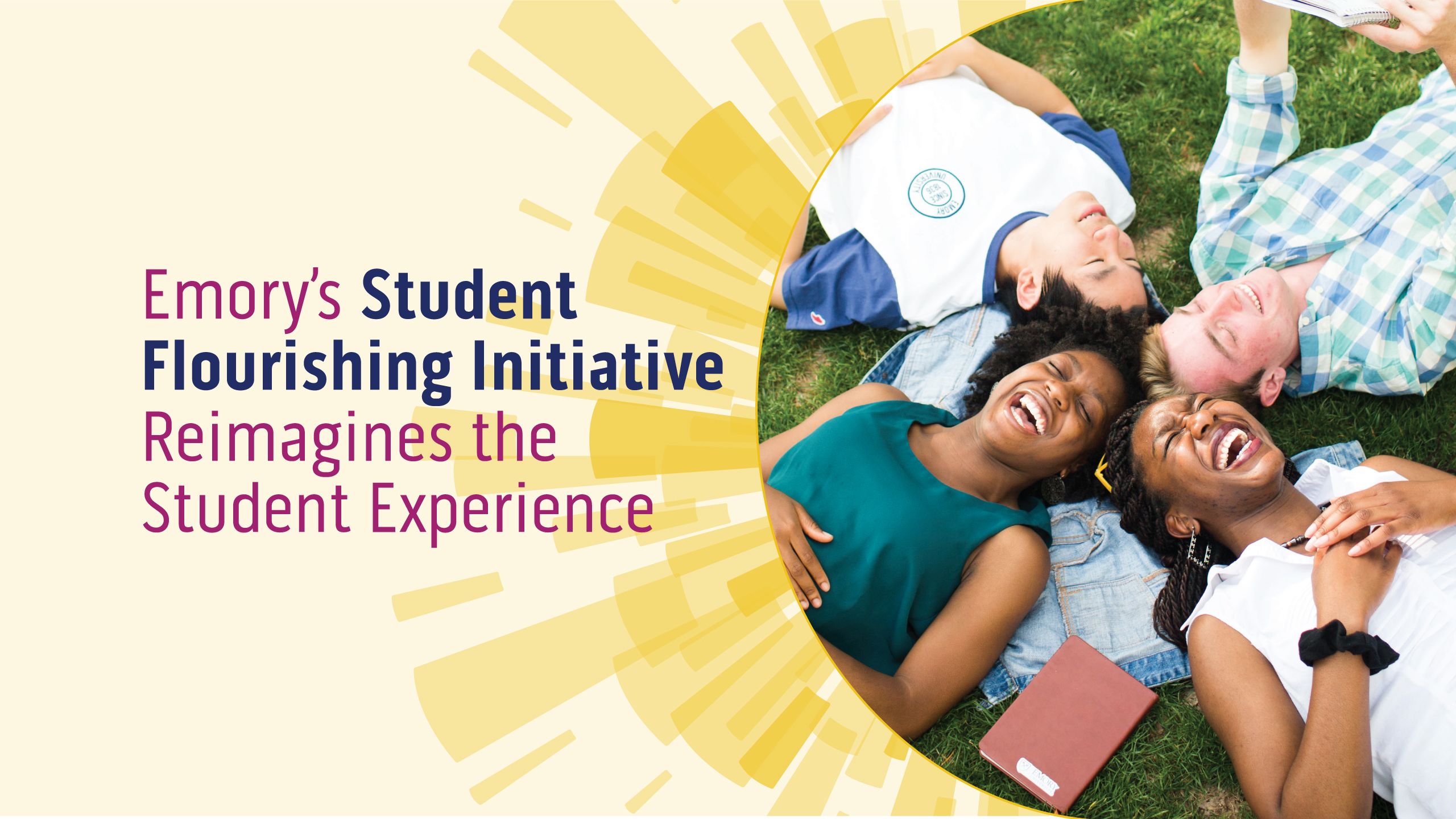
With a host of programs launching this year, Emory is creating new ways for students to find academic, professional and personal success

Make good grades. Join a dozen clubs. Get into a top university. Land a high-paying job. Live happily ever after.
For many college students, their journeys thus far have been paved with gold stars and trophies, always chasing the next great achievement. Then, halfway through college or in many cases after graduation, they realize that there is no syllabus for how to live a fulfilling life. Finding purpose and being the best version of oneself is an intentional undertaking that unfolds daily.
As a part of Emory’s new Student Flourishing initiative, students will be given opportunities inside and outside of the classroom to reflect on who they want to be and how they want to use their intellect to make a positive impact on society.
“Investing in student flourishing at Emory is about preparing students for a lifetime of fulfillment, integrity, creativity and service,” says Emory President Gregory L. Fenves. “We want our students to be able to answer two key questions for themselves: ‘What do I want to be?’ and ‘Who do I want to be?’ The former means using your Emory education to discover a career and post-graduate pursuits you are passionate about. The second question is even more important because it focuses on the values, sense of purpose, meaning and inspiration that lead to a life well lived. We want our graduates to not only achieve ambitiously, but to thrive while doing so.”

“To get into a place like Emory, students are asked to stand out amongst their peers through their achievements,” says Ravi V. Bellamkonda, provost and executive vice president of academic affairs.
“It’s natural that once students get to college, they continue to follow the same ‘recipe’ of proving they are smart and know how to get A’s. We want students to learn, to rise to challenges and to learn new skills. However, at Emory, we also want our students to build a muscle for reflection, to understand the real purpose and opportunity of college — to define their own path and lay the foundation for a meaningful life.
“The promise of the Student Flourishing initiative is that we’re intentionally nurturing the whole human being, recognizing that skills, intellect, ethics, values and purpose need to be woven together for life to be fulfilling,” notes Bellamkonda.
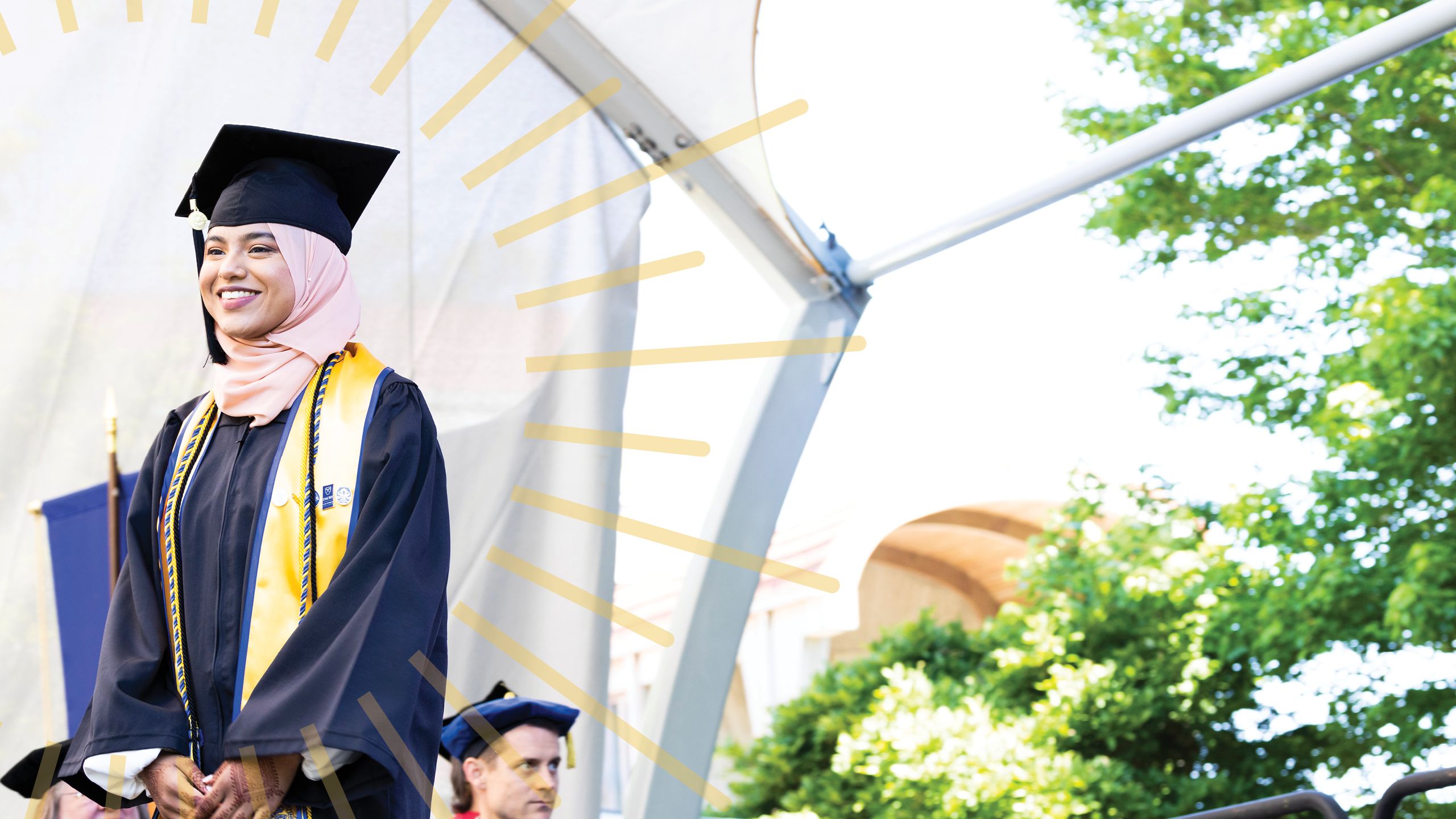
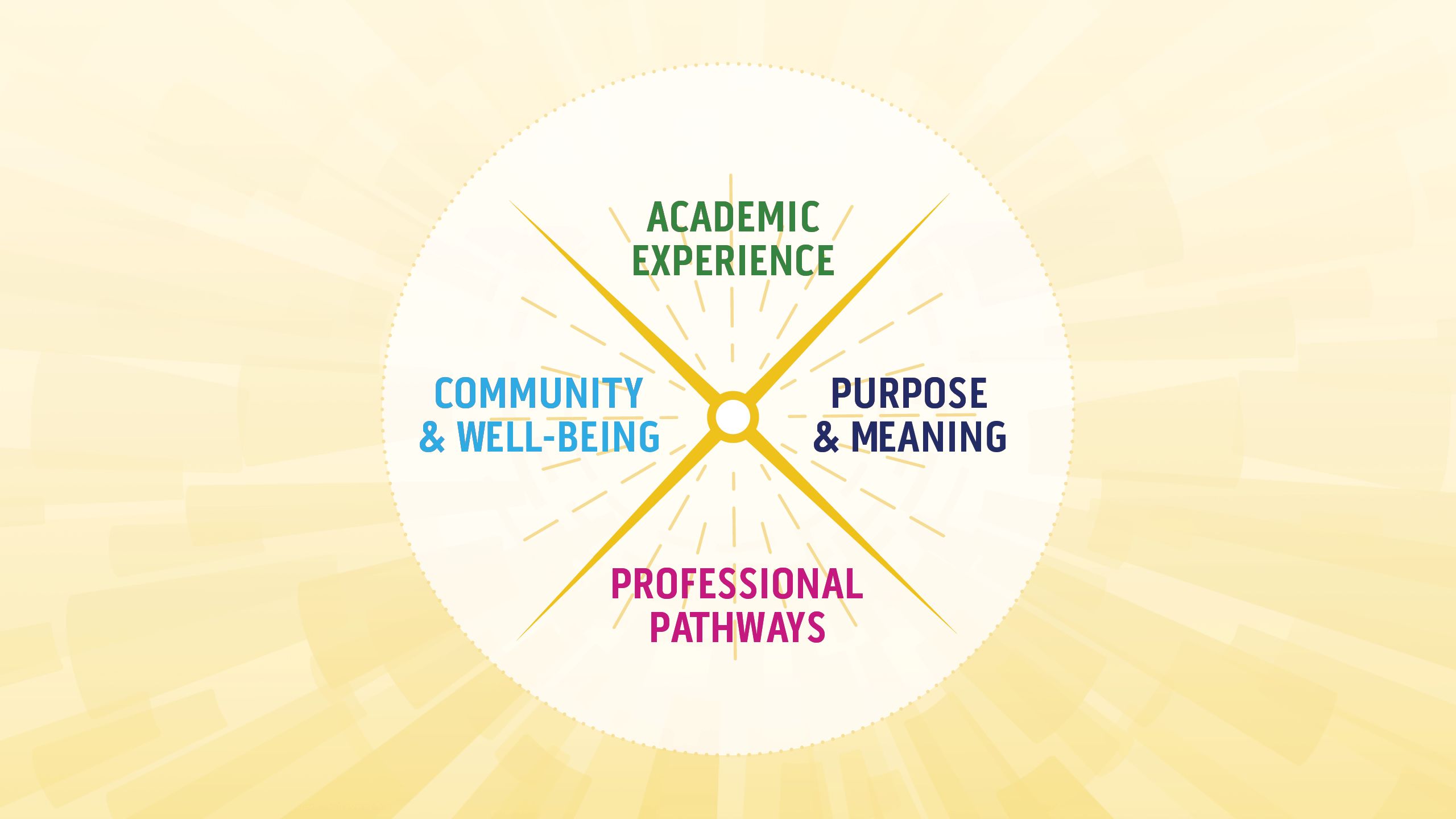
Student Flourishing is one of the three pillars of the 2O36 campaign, and the initiative focuses on four interconnected dimensions of the student experience:
- ACADEMIC EXPERIENCE: Innovative teaching and expanded access to all Emory has to offer
- PROFESSIONAL PATHWAYS: Holistic career exploration and professional development
- PURPOSE AND MEANING: Creating opportunities to reflect on questions of ethics, purpose and meaning through the Emory Purpose Project
- COMMUNITY AND WELL-BEING: Integrated support for health and wellness, with a culture that builds community and belonging
VIDEO: What Is Student Flourishing at Emory?
These four dimensions touch every part of the student journey, from undergraduate education to Campus Life. Over the past year, teams of faculty, staff and administrators across Emory have begun the work of re-envisioning and transforming how students experience their education. From major initiatives such as the Pathways Center, Emory Purpose Project and Undergraduate Council to a range of pilot programs, courses and improvements, new ideas are starting to roll out across the Atlanta and Oxford campuses as the Student Flourishing initiative takes root.
“Emory is one of the rare schools that is focusing on how to incorporate teaching about flourishing and teaching for flourishing on campus,” says Ira Bedzow, senior fellow at the center for the study of law and religion. Bedzow co-leads the Purpose Project, a cross-school Student Flourishing team focused on developing opportunities for reflective practice.
“Emory is unique because it envisions flourishing education to encompass more than just formal classroom instruction,” Bedzow continues. “The initiative is being embedded in all aspects of the student experience to ensure that such a transformational education can happen.”

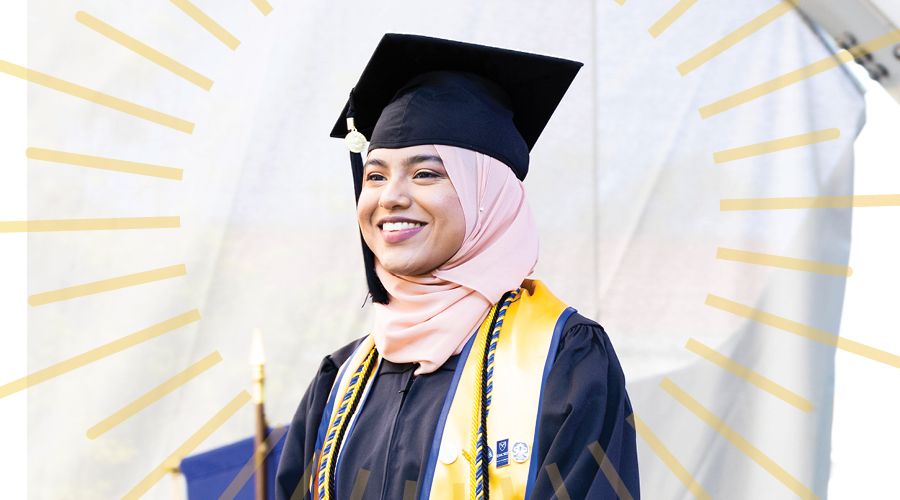
Make good grades. Join a dozen clubs. Get into a top university. Land a high-paying job. Live happily ever after.
For many college students, their journeys thus far have been paved with gold stars and trophies, always chasing the next great achievement. Then, halfway through college or in many cases after graduation, they realize that there is no syllabus for how to live a fulfilling life. Finding purpose and being the best version of oneself is an intentional undertaking that unfolds daily.
As a part of Emory’s new Student Flourishing initiative, students will be given opportunities inside and outside of the classroom to reflect on who they want to be and how they want to use their intellect to make a positive impact on society.
“Investing in student flourishing at Emory is about preparing students for a lifetime of fulfillment, integrity, creativity and service,” says Emory President Gregory L. Fenves. “We want our students to be able to answer two key questions for themselves: ‘What do I want to be?’ and ‘Who do I want to be?’ The former means using your Emory education to discover a career and post-graduate pursuits you are passionate about. The second question is even more important because it focuses on the values, sense of purpose, meaning and inspiration that lead to a life well lived. We want our graduates to not only achieve ambitiously, but to thrive while doing so.”

“To get into a place like Emory, students are asked to stand out amongst their peers through their achievements,” says Ravi V. Bellamkonda, provost and executive vice president of academic affairs.
“It’s natural that once students get to college, they continue to follow the same ‘recipe’ of proving they are smart and know how to get A’s. We want students to learn, to rise to challenges and to learn new skills. However, at Emory, we also want our students to build a muscle for reflection, to understand the real purpose and opportunity of college — to define their own path and lay the foundation for a meaningful life. The promise of the Student Flourishing initiative is that we’re intentionally nurturing the whole human being, recognizing that skills, intellect, ethics, values and purpose need to be woven together for life to be fulfilling,” notes Bellamkonda.
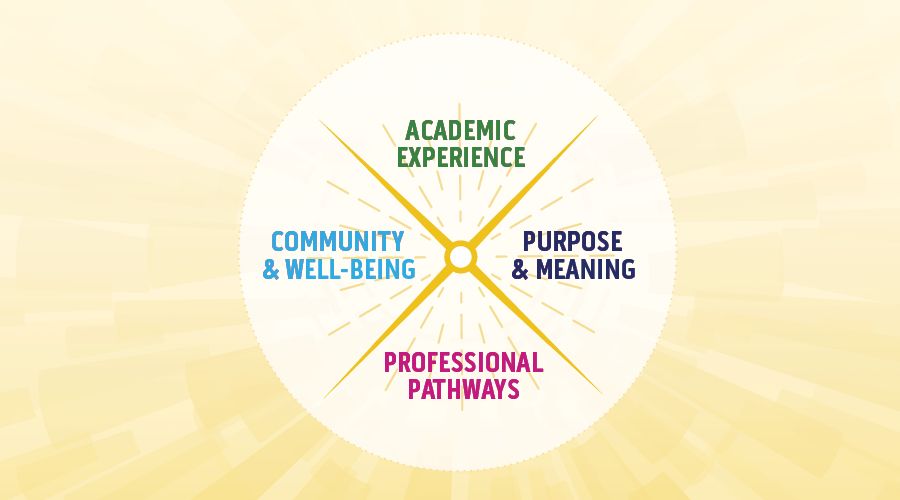
Student Flourishing is one of the three pillars of the 2O36 campaign, and the initiative focuses on four interconnected dimensions of the student experience:
- ACADEMIC EXPERIENCE: Innovative teaching and expanded access to all Emory has to offer
- PROFESSIONAL PATHWAYS: Holistic career exploration and professional development
- PURPOSE AND MEANING: Creating opportunities to reflect on questions of ethics, purpose and meaning through the Emory Purpose Project
- COMMUNITY AND WELL-BEING: Integrated support for health and wellness, with a culture that builds community and belonging
VIDEO: What Is Student Flourishing at Emory?
These four dimensions touch every part of the student journey, from undergraduate education to Campus Life. Over the past year, teams of faculty, staff and administrators across Emory have begun the work of re-envisioning and transforming how students experience their education. From major initiatives such as the Pathways Center, Emory Purpose Project and Undergraduate Council to a range of pilot programs, courses and improvements, new ideas are starting to roll out across the Atlanta and Oxford campuses as the Student Flourishing initiative takes root.
“Emory is one of the rare schools that is focusing on how to incorporate teaching about flourishing and teaching for flourishing on campus,” says Ira Bedzow, senior fellow at the center for the study of law and religion. Bedzow co-leads the Purpose Project, a cross-school Student Flourishing team focused on developing opportunities for reflective practice.
“Emory is unique because it envisions flourishing education to encompass more than just formal classroom instruction,” Bedzow continues. “The initiative is being embedded in all aspects of the student experience to ensure that such a transformational education can happen.”
Opening doors to flourishing

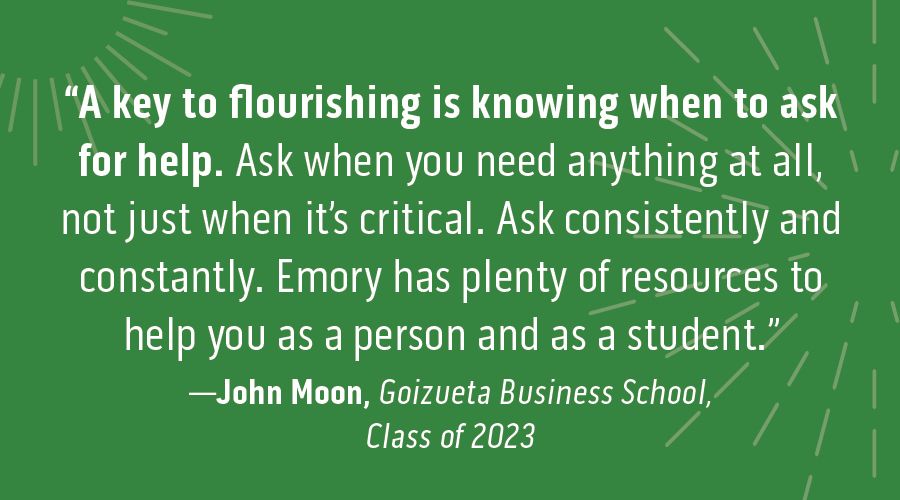
A major priority of the Student Flourishing initiative is removing barriers for students to chart their own educational futures. This includes everything from streamlining the registration process to extending the drop/add/swap deadline.
Earlier in the year, the university announced that it would eliminate need-based loans for undergraduate students with the greatest demonstrated need, replacing the loans with institutional grants and scholarships beginning this fall for the 2022-23 academic year. Expanding the Emory Advantage program removes financial barriers to flourishing.
The university is also investing in more innovative courses that bridge the gap between classroom theory and real-world experiences. Over the summer, five Emory College students participated in the DataThink project in the Department of Quantitative Theory and Methods. In this experiential learning course sponsored by Microsoft, the students used data from the Atlanta Regional Commission to build a model that quantifies the metro Atlanta rental landscape. The course marries the AI.Humanity and student flourishing tenets of the 2O36 campaign, and serves as a model for future experiential courses.
“By ensuring greater connections between what happens in the classroom and the experiences students have beyond it, we can provide a more fully integrated educational experience,” says Joanne Brzinski, senior associate dean for undergraduate education in Emory College. “From experiential learning to more deliberate career development, the new programs and opportunities within the Student Flourishing initiative will better prepare students for personal and professional lives of achievement, meaning and purpose.”
Another exciting component of the Student Flourishing initiative is the opportunity to increase access to Goizueta Business School courses by creating new points of entry into the program. Historically, students who wanted to enroll in the BBA program had to wait for admission into Goizueta Business School when they achieved junior standing. Under the new BBA curriculum, students can choose to enter the program as early as the beginning of sophomore year.
Additionally, starting in January 2023, Emory College of Arts and Sciences students will have the option to pursue a minor in business in conjunction with their liberal arts major. Also, as part of the Goizueta @ Oxford program, the business school will offer pre-BBA advising, career coaching and additional business courses to Oxford students, who constitute 15% of enrolled Goizueta BBA students.
Andrea Hershatter, senior associate dean of undergraduate education at Goizueta, says that the new business minor will remove barriers to business knowledge.
“By giving students in the minor access to the foundational areas of business, they will learn how organizations function, and how to be more effective within them,” says Hershatter. “Our intention is that liberal arts students will use the minor in order to transfer their intellectual passions into meaningful work within an applied setting.”
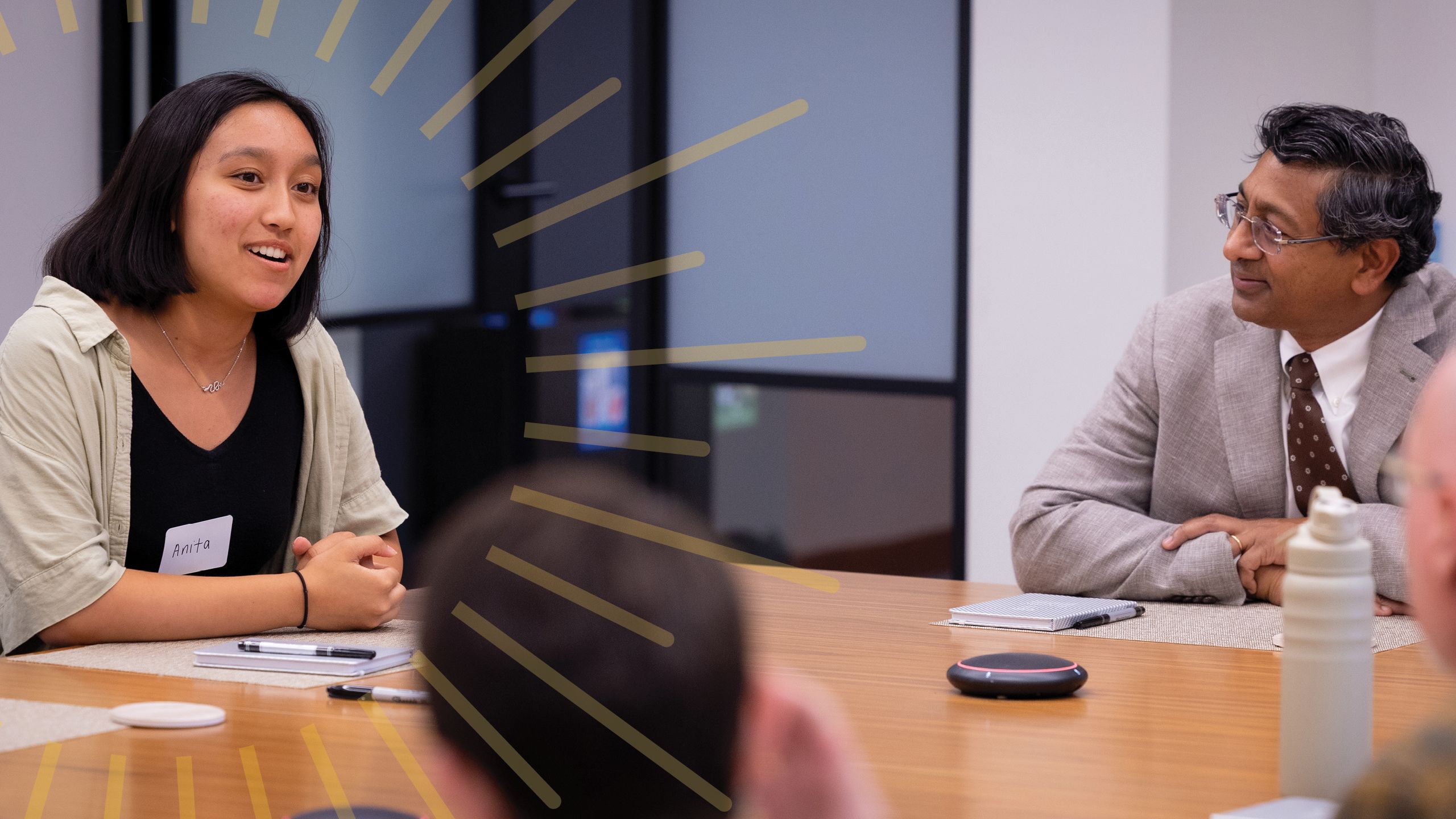
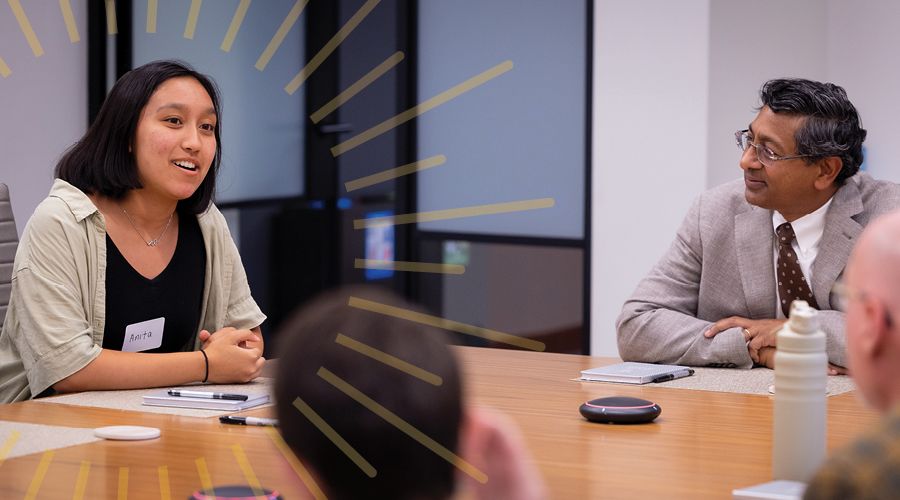
A major priority of the Student Flourishing initiative is removing barriers for students to chart their own educational futures. This includes everything from streamlining the registration process to extending the drop/add/swap deadline.
Earlier in the year, the university announced that it would eliminate need-based loans for undergraduate students with the greatest demonstrated need, replacing the loans with institutional grants and scholarships beginning this fall for the 2022-23 academic year. Expanding the Emory Advantage program removes financial barriers to flourishing.
The university is also investing in more innovative courses that bridge the gap between classroom theory and real-world experiences. Over the summer, five Emory College students participated in the DataThink project in the Department of Quantitative Theory and Methods. In this experiential learning course sponsored by Microsoft, the students used data from the Atlanta Regional Commission to build a model that quantifies the metro Atlanta rental landscape. The course marries the AI.Humanity and student flourishing tenets of the 2O36 campaign, and serves as a model for future experiential courses.
“By ensuring greater connections between what happens in the classroom and the experiences students have beyond it, we can provide a more fully integrated educational experience,” says Joanne Brzinski, senior associate dean for undergraduate education in Emory College. “From experiential learning to more deliberate career development, the new programs and opportunities within the Student Flourishing initiative will better prepare students for personal and professional lives of achievement, meaning and purpose.”
Another exciting component of the Student Flourishing initiative is the opportunity to increase access to Goizueta Business School courses by creating new points of entry into the program. Historically, students who wanted to enroll in the BBA program had to wait for admission into Goizueta Business School when they achieved junior standing. Under the new BBA curriculum, students can choose to enter the program as early as the beginning of sophomore year.

Additionally, starting in January 2023, Emory College of Arts and Sciences students will have the option to pursue a minor in business in conjunction with their liberal arts major. Also, as part of the Goizueta @ Oxford program, the business school will offer pre-BBA advising, career coaching and additional business courses to Oxford students, who constitute 15% of enrolled Goizueta BBA students.
Andrea Hershatter, senior associate dean of undergraduate education at Goizueta, says that the new business minor will remove barriers to business knowledge.
“By giving students in the minor access to the foundational areas of business, they will learn how organizations function, and how to be more effective within them,” says Hershatter. “Our intention is that liberal arts students will use the minor in order to transfer their intellectual passions into meaningful work within an applied setting.”
More than a job

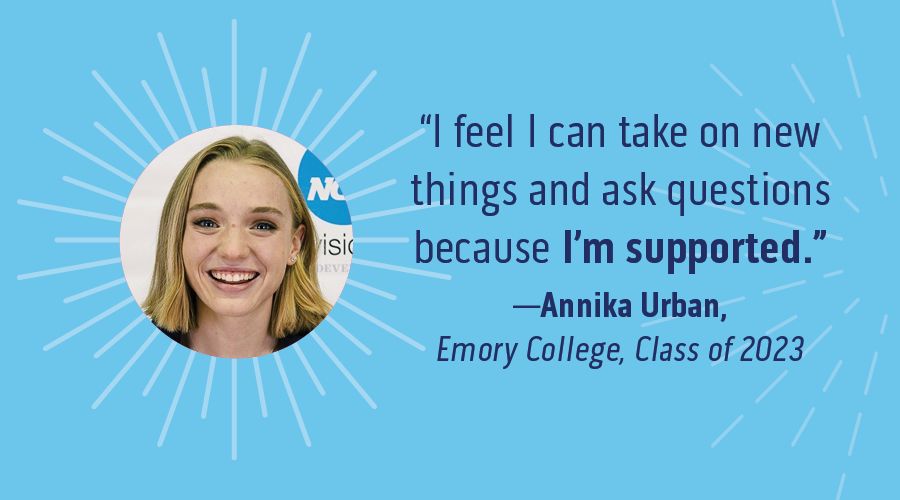
Thinking about how to apply liberal arts principles in industry is precisely what Branden Grimmett is doing with the new Pathways Center. The Pathways Center will prepare undergraduate students for meaningful post-graduate opportunities by offering professional development, career exploration, experiential learning, mentorship opportunities and more.
Grimmett, who is the new vice provost for career and professional development and associate dean in Emory College, knows firsthand what it looks like to carve out an unconventional career path.
He is a classically trained organist with a master’s degree in theology and a PhD in education. As a person of color in higher education, he says he recognizes the barriers that may exist for students from marginalized groups. He also understands the importance of creating connections for a lasting career.
“When students come to Emory as undergraduates, they know what school is and how to be successful academically, but they do not know what a career is,” says Grimmett. “They need to be taught what career management looks like and how to practice it. The Pathways Center will be instrumental in helping students understand the world of work.”
The counterpart to the Pathways Center is Oxford’s Center for Pathways and Purpose (CPP), which will launch in fall 2023. The CPP will connect opportunities at Oxford and in Atlanta as well as help students find opportunities for study abroad, internships, research, fellowships and more.
The Pathways Center will eventually have its own physical space on campus, but for now Grimmett is building a team to transform the way the university talks to students about meaningful work and their liberal arts education.
“Pre-health students, for instance, need to understand how their liberal arts classes are preparing them to serve patients at the bedside,” says Grimmett. “We also want to train Emory graduates to pay it forward in a way that goes beyond their own professional interests. If we do that effectively, then any Emory student who interacts with an Emory alumnus can potentially find a mentor.”

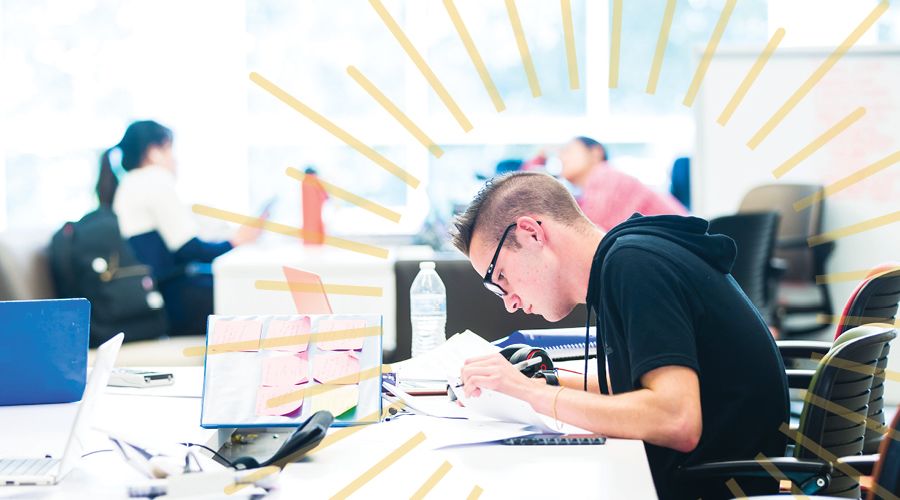
Thinking about how to apply liberal arts principles in industry is precisely what Branden Grimmett is doing with the new Pathways Center. The Pathways Center will prepare undergraduate students for meaningful post-graduate opportunities by offering professional development, career exploration, experiential learning, mentorship opportunities and more.
Grimmett, who is the new vice provost for career and professional development and associate dean in Emory College, knows firsthand what it looks like to carve out an unconventional career path.
He is a classically trained organist with a master’s degree in theology and a PhD in education. As a person of color in higher education, he says he recognizes the barriers that may exist for students from marginalized groups. He also understands the importance of creating connections for a lasting career.

“When students come to Emory as undergraduates, they know what school is and how to be successful academically, but they do not know what a career is,” says Grimmett. “They need to be taught what career management looks like and how to practice it. The Pathways Center will be instrumental in helping students understand the world of work.”
The counterpart to the Pathways Center is Oxford’s Center for Pathways and Purpose (CPP), which will launch in fall 2023. The CPP will connect opportunities at Oxford and in Atlanta as well as help students find opportunities for study abroad, internships, research, fellowships and more.
The Pathways Center will eventually have its own physical space on campus, but for now Grimmett is building a team to transform the way the university talks to students about meaningful work and their liberal arts education.
“Pre-health students, for instance, need to understand how their liberal arts classes are preparing them to serve patients at the bedside,” says Grimmett. “We also want to train Emory graduates to pay it forward in a way that goes beyond their own professional interests. If we do that effectively, then any Emory student who interacts with an Emory alumnus can potentially find a mentor.”
The Emory Purpose Project

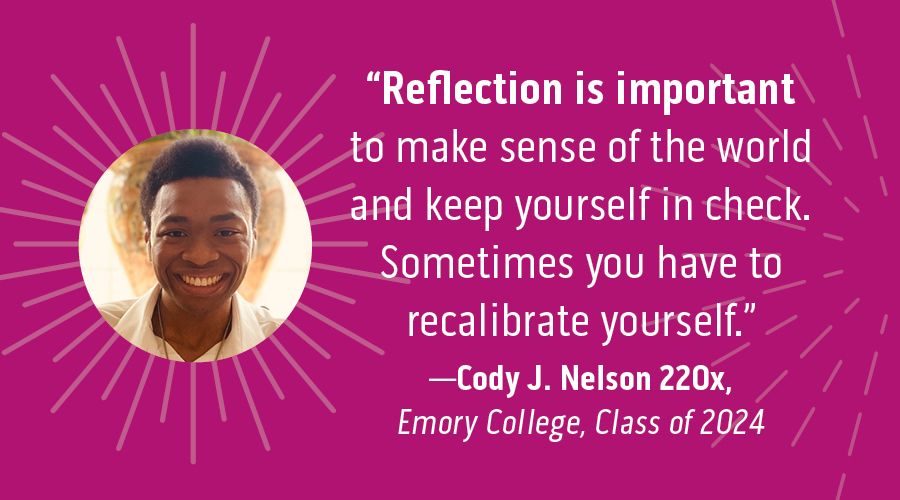
The path to finding a fulfilling career starts with knowing one’s purpose. Too often, people don’t think about their purpose until they are down the road in a job or relationship they dislike. The “purpose and meaning” dimension of the Student Flourishing initiative is designed to get students reflecting on who they are early.
Through the Emory Purpose Project (EPP) — among the most distinctive parts of Emory’s reimagined student experience — Bellamkonda charged a university-wide team with examining how space for reflection, defining purpose and focusing on ethics can be created across all areas of campus. The effort is led by Emory College’s Michelle Lampl and Ed Lee III, Goizueta Business School’s Ken Keen and Emory Law School’s Ira Bedzow.
In one of EPP’s first efforts to support student flourishing, the Health 100 class — required for all first-year students on the Atlanta and Oxford campuses — has been reimagined to include modules focused on positive mental health, values and character strengths, and developing one’s own health vision and goals.
Christine Whelan, the visiting “purpose professor,” will be having conversations with Health 100 students about purpose and well-being. Whelan is the author of several books and courses on purpose and relationships, including her Audible guide “Finding Your Purpose” and the 2021 book “The Big Picture.”
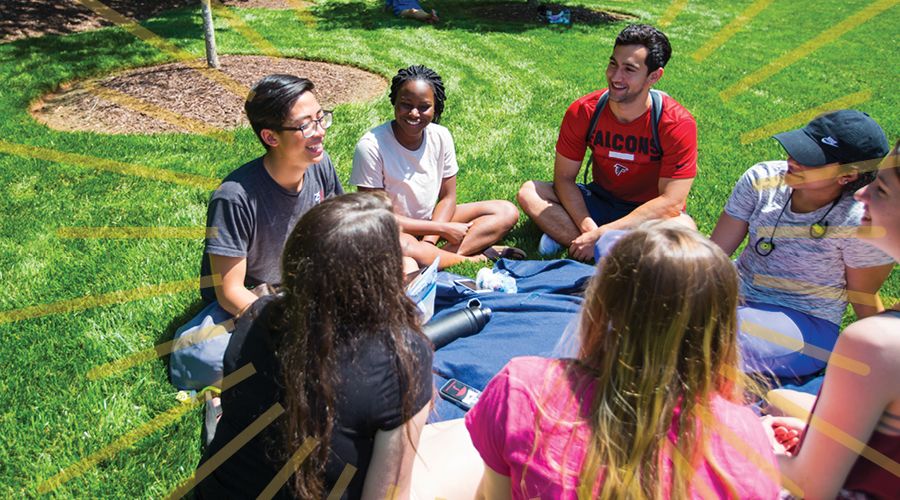
At Oxford College, students engaged in reflective work this past spring when the first full cohort of second-year students completed the one-credit Oxford Milestone class. As a part of the course, students created an e-portfolio and penned a 1,000-word essay reflecting on who they were when they started at Oxford and how their classroom and extracurricular activities may have transformed them.
Peter McLellan, who leads the Oxford Milestone Project, says that he sees the student projects as a measure of how well the university is doing at creating a sense of belonging.
“We know reflection helps students professionally and more broadly in moments when they are in transition,” says McLellan. “It helps them build relationships. When you know who you are, when you’re faced with challenges, troubles and opportunities, you’re more likely to overcome those situations.”
Students participated in similar reflection work in the new first-year flourishing seminars. In these weekly seminars, students think about flourishing in a variety of areas from the power of storytelling to ending systemic racism. Students in these seminars met for dinners throughout the semester where they discussed flourishing with experts.
Plus, this fall semester, 15-20 students had the opportunity to explore flourishing and build community in a purposeful way through the inaugural Flourishing Fellows program.
Helmed by Rabbi Jordan Braunig of the Office of Spiritual and Religious Life, the fellowship is designed to equip students of all beliefs and backgrounds with the skills to facilitate deep and thoughtful conversations among their peers about a variety of social, political and spiritual issues. Through a series of 25 sessions, students learned active listening skills and worked their empathy muscles.
“We are more connected than we’ve ever been and yet we’re struggling to connect with each other more than we ever have,” says Braunig. “If things are working right, if flourishing is happening, students are connecting with people across lines of identity. Yes, we want to send people out into the world who are doing amazing research in their labs, but we also want them to know how to build a friendship. It seems so basic, but it isn’t.”
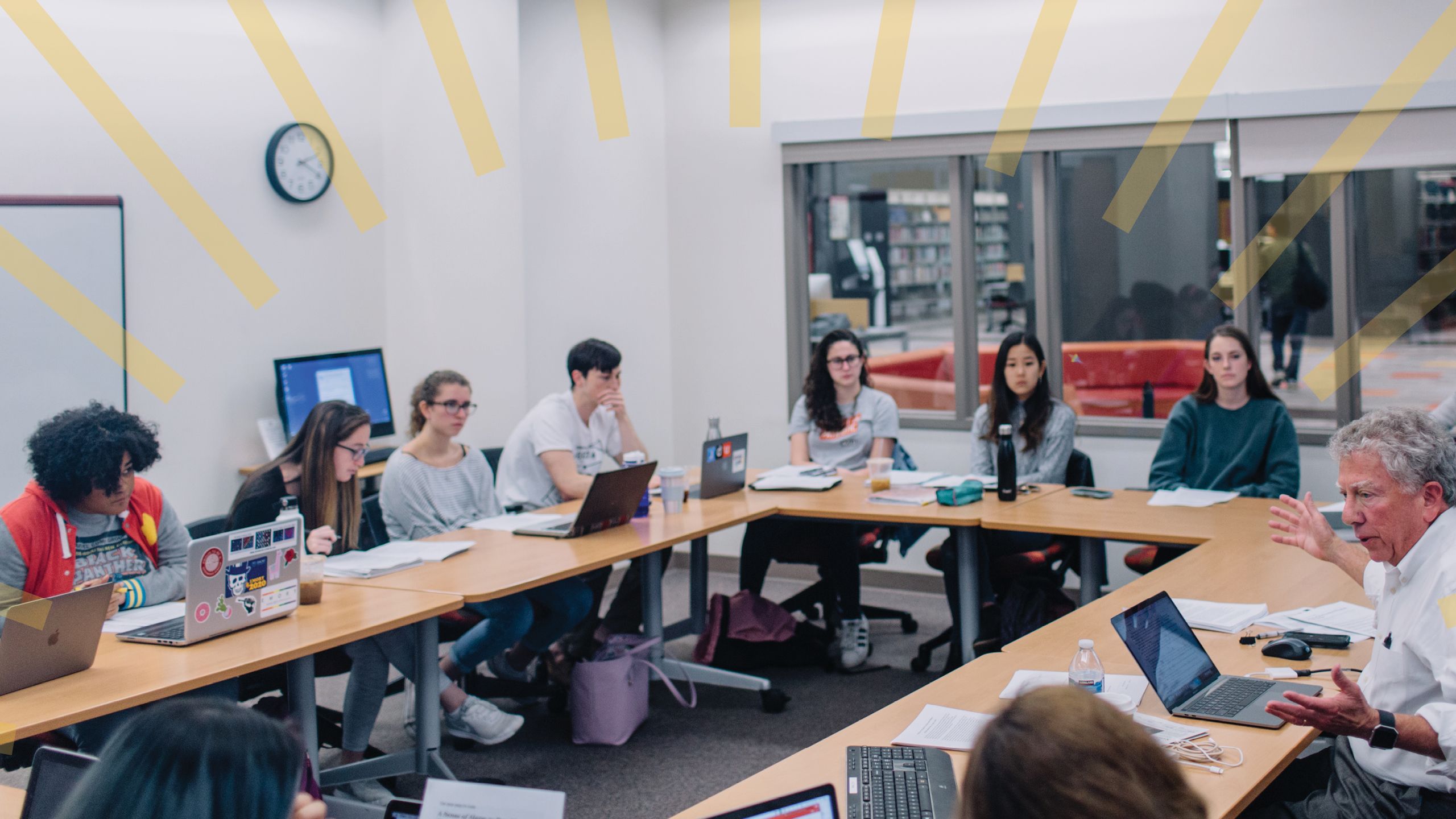
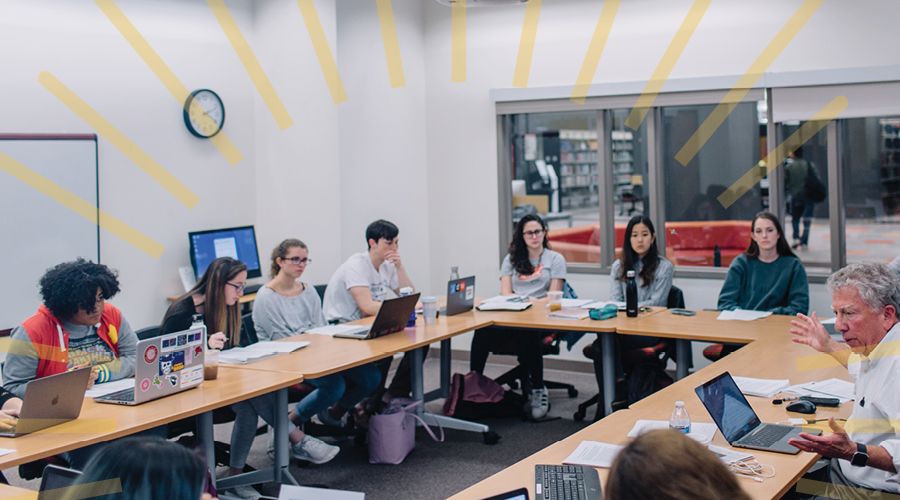
The path to finding a fulfilling career starts with knowing one’s purpose. Too often, people don’t think about their purpose until they are down the road in a job or relationship they dislike. The “purpose and meaning” dimension of the Student Flourishing initiative is designed to get students reflecting on who they are early.
Through the Emory Purpose Project (EPP) — among the most distinctive parts of Emory’s reimagined student experience — Provost Bellamkonda charged a university-wide team with examining how space for reflection, defining purpose and focusing on ethics can be created across all areas of campus. The effort is led by Emory College’s Michelle Lampl and Ed Lee III, Goizueta Business School’s Ken Keen and Emory Law School’s Ira Bedzow.
In one of EPP’s first efforts to support student flourishing, the Health 100 class — required for all first-year students on the Atlanta and Oxford campuses — has been reimagined to include modules focused on positive mental health, values and character strengths, and developing one’s own health vision and goals.
Christine Whelan, the visiting “purpose professor,” will be having conversations with Health 100 students about purpose and well-being. Whelan is the author of several books and courses on purpose and relationships, including her Audible guide “Finding Your Purpose” and the 2021 book “The Big Picture.”

At Oxford College, students engaged in reflective work this past spring when the first full cohort of second-year students completed the one-credit Oxford Milestone class. As a part of the course, students created an e-portfolio and penned a 1,000-word essay reflecting on who they were when they started at Oxford and how their classroom and extracurricular activities may have transformed them.
Peter McLellan, who leads the Oxford Milestone Project, says that he sees the student projects as a measure of how well the university is doing at creating a sense of belonging.
“We know reflection helps students professionally and more broadly in moments when they are in transition,” says McLellan. “It helps them build relationships. When you know who you are, when you’re faced with challenges, troubles and opportunities, you’re more likely to overcome those situations.”

Students participated in similar reflection work in the new first-year flourishing seminars. In these weekly seminars, students think about flourishing in a variety of areas from the power of storytelling to ending systemic racism. Students in these seminars met for dinners throughout the semester where they discussed flourishing with experts.
Plus, this fall, 15-20 students had the opportunity to explore flourishing and build community in a purposeful way through the inaugural Flourishing Fellows program.
Helmed by Rabbi Jordan Braunig of the Office of Spiritual and Religious Life, the fellowship is designed to equip students of all beliefs and backgrounds with the skills to facilitate deep and thoughtful conversations among their peers about a variety of social, political and spiritual issues. Through a series of 25 sessions, students learned active listening skills and worked their empathy muscles.
“We are more connected than we’ve ever been and yet we’re struggling to connect with each other more than we ever have,” says Braunig. “If things are working right, if flourishing is happening, students are connecting with people across lines of identity. Yes, we want to send people out into the world who are doing amazing research in their labs, but we also want them to know how to build a friendship. It seems so basic, but it isn’t.”
Belonging leads to well-being

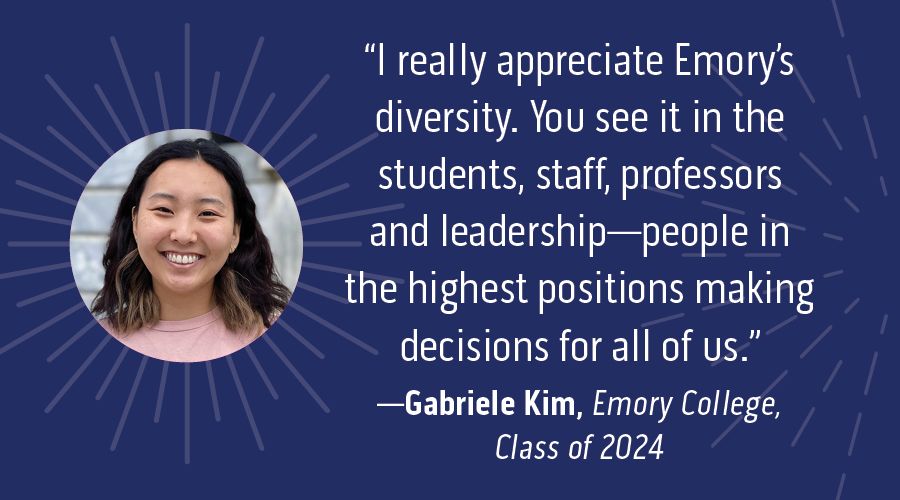
Decades of research show that success in college is also tied to a sense of belonging outside of the classroom. At Emory, students are encouraged to bring their whole, authentic selves to campus, and the Student Flourishing initiative will help them engage in numerous ways.
Campus Life is the area where many students find their sense of belonging, whether through sports, co-curricular activities or affinity groups. To enhance the student experience, they published the “Be Well, Your Way” digital resource hub in the spring to connect students to a variety of resources covering everything from mental and sexual health to academic and financial support. They also hired James Raper, Emory’s first associate vice president for health, well-being, access and prevention.
For incoming students, Campus Life is also a place to build community early. This fall, 30% of first-year students participated in preorientation programs. Preorientation allows students to get a jump-start on exploring their interests, covering topics such as leadership development, religion and spirituality and careers in STEM. This year, new offerings gave students the chance to connect with peers who were interested in innovation, social justice, sustainability and more.
“We don’t define who they ultimately become; that’s their journey,” says Enku Gelaye, senior vice president and dean of Campus Life. “We create opportunities for them to explore. We also don’t assume that they don’t have formed, or forming, identities when they get to us. No student comes here a blank slate.”
One of the biggest projects coming out of Campus Life is the Identity Spaces Project, which involves the renovation of Cox Hall. The first phase of the project involved renovating existing cultural identity spaces on the first floor of the Alumni Memorial University Center. In fall 2023, there will be new spaces for Asian Pacific Islander Desi/American students, the Center for Women at Emory, Centro Latinx, Emory Black Student Union (EBSU) and Lesbian Gay Bisexual Transgender Life on the third floor of Cox Hall.
Gelaye hopes that by moving students into one space, there will be opportunities for cross-sectional programming to explore multiple identities.
“You can be at El Centro and EBSU at the same time if you’re Afro Latina, for example,” says Gelaye. “Those spaces can be programming around similar concepts but also serve as launch points for students to utilize other opportunities at the university, such as research and study abroad. The center is not the only place these students can experience Emory. It’s a launching point to accessing all of Emory.”
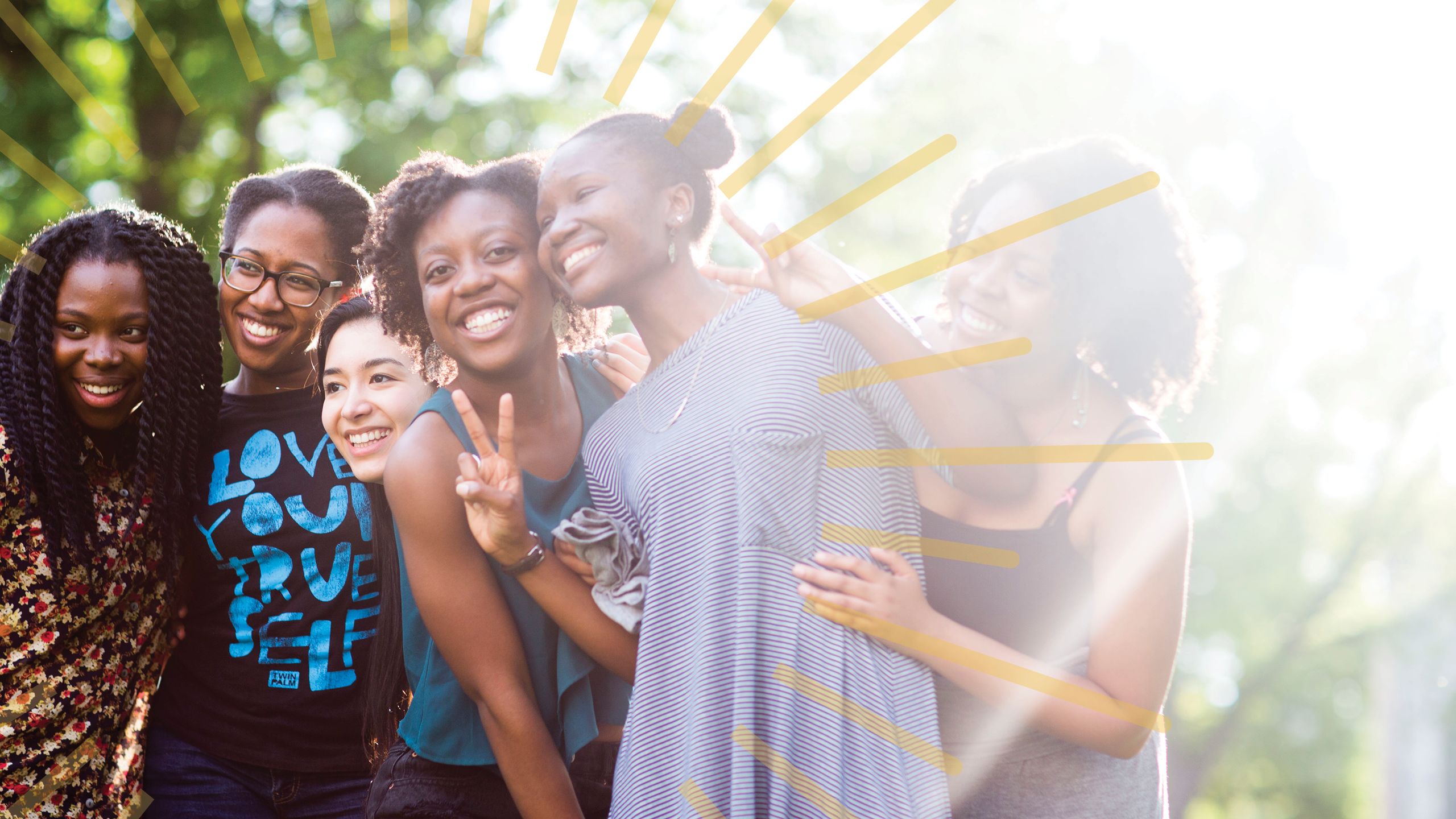
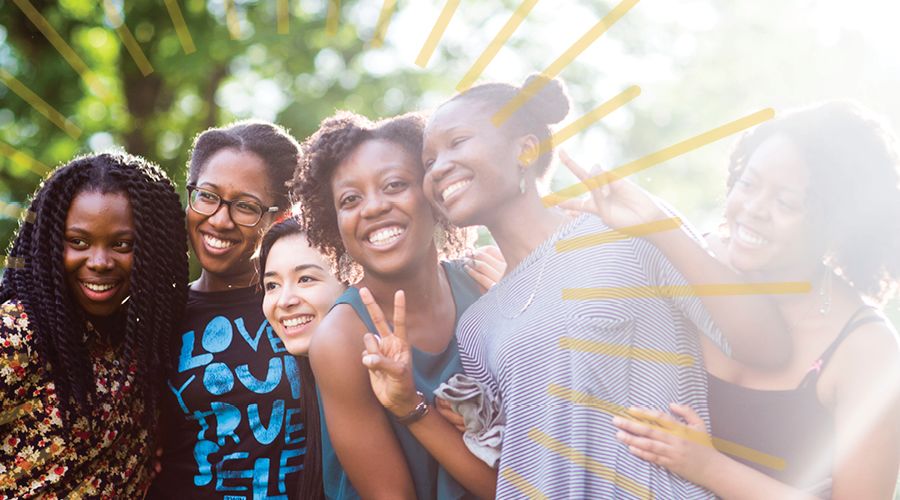
Decades of research show that success in college is also tied to a sense of belonging outside of the classroom. At Emory, students are encouraged to bring their whole, authentic selves to campus, and the Student Flourishing initiative will help them engage in numerous ways.
Campus Life is the area where many students find their sense of belonging, whether through sports, co-curricular activities or affinity groups. To enhance the student experience, they published the “Be Well, Your Way” digital resource hub in the spring to connect students to a variety of resources covering everything from mental and sexual health to academic and financial support. They also hired James Raper, Emory’s first associate vice president for health, well-being, access and prevention.
For incoming students, Campus Life is also a place to build community early. This fall, 30% of first-year students participated in preorientation programs. Preorientation allows students to get a jump-start on exploring their interests, covering topics such as leadership development, religion and spirituality and careers in STEM. This year, new offerings gave students the chance to connect with peers who were interested in innovation, social justice, sustainability and more.

“We don’t define who they ultimately become; that’s their journey,” says Enku Gelaye, senior vice president and dean of campus life. “We create opportunities for them to explore. We also don’t assume that they don’t have formed, or forming, identities when they get to us. No student comes here a blank slate.”
One of the biggest projects coming out of Campus Life is the Identity Spaces Project, which involves the renovation of Cox Hall. The first phase of the project involved renovating existing cultural identity spaces on the first floor of the Alumni Memorial University Center. In fall 2023, there will be new spaces for Asian Pacific Islander Desi/American students, the Center for Women at Emory, Centro Latinx, Emory Black Student Union (EBSU) and Lesbian Gay Bisexual Transgender Life on the third floor of Cox Hall.
Gelaye hopes that by moving students into one space, there will be opportunities for cross-sectional programming to explore multiple identities.
“You can be at El Centro and EBSU at the same time if you’re Afro Latina, for example,” says Gelaye. “Those spaces can be programming around similar concepts but also serve as launch points for students to utilize other opportunities at the university, such as research and study abroad. The center is not the only place these students can experience Emory. It’s a launching point to accessing all of Emory.”
More ways to explore

Giving students more opportunities to explore and define their own, meaningful paths is the central mission of the Student Flourishing initiative. From new and reimagined courses to additional spaces for reflection and connection, student flourishing will fundamentally change how Emory defines student success.
As programs roll out during the next couple of years, they will be evaluated by an assessment group, the Emory Undergraduate Council, EPP and, of course, responses from students.
The seven liberal arts, as outlined by Greek philosophers, are grammar, rhetoric, dialectic, music, arithmetic, geometry and astronomy. For Provost Bellamkonda, the Student Flourishing initiative is building upon these traditional studies to create a better world.
“The Student Flourishing initiative is a journey to rediscover the liberal arts,” says Bellamkonda. “At the time they were conceptualized, these were the skills necessary for a person to be successful in life. At Emory we believe that today’s liberal arts remain fantastic vehicles to instill certain habits of the mind, including critical thinking, reflection and analysis, so our students can flourish professionally and lead fulfilling lives.”
Gelaye agrees, adding, “What would be an incredible marker of our success is that when they graduate, students will say Emory cared about me as an individual, that Emory met me where I am and being at Emory helped me be a better person.”
ABOUT THIS STORY: Written by Kelundra Smith. Emory campus photos by Kay Hinton. Oxford campus photos by Stacey Towler. Design by Laura Dengler and Linda Dobson.
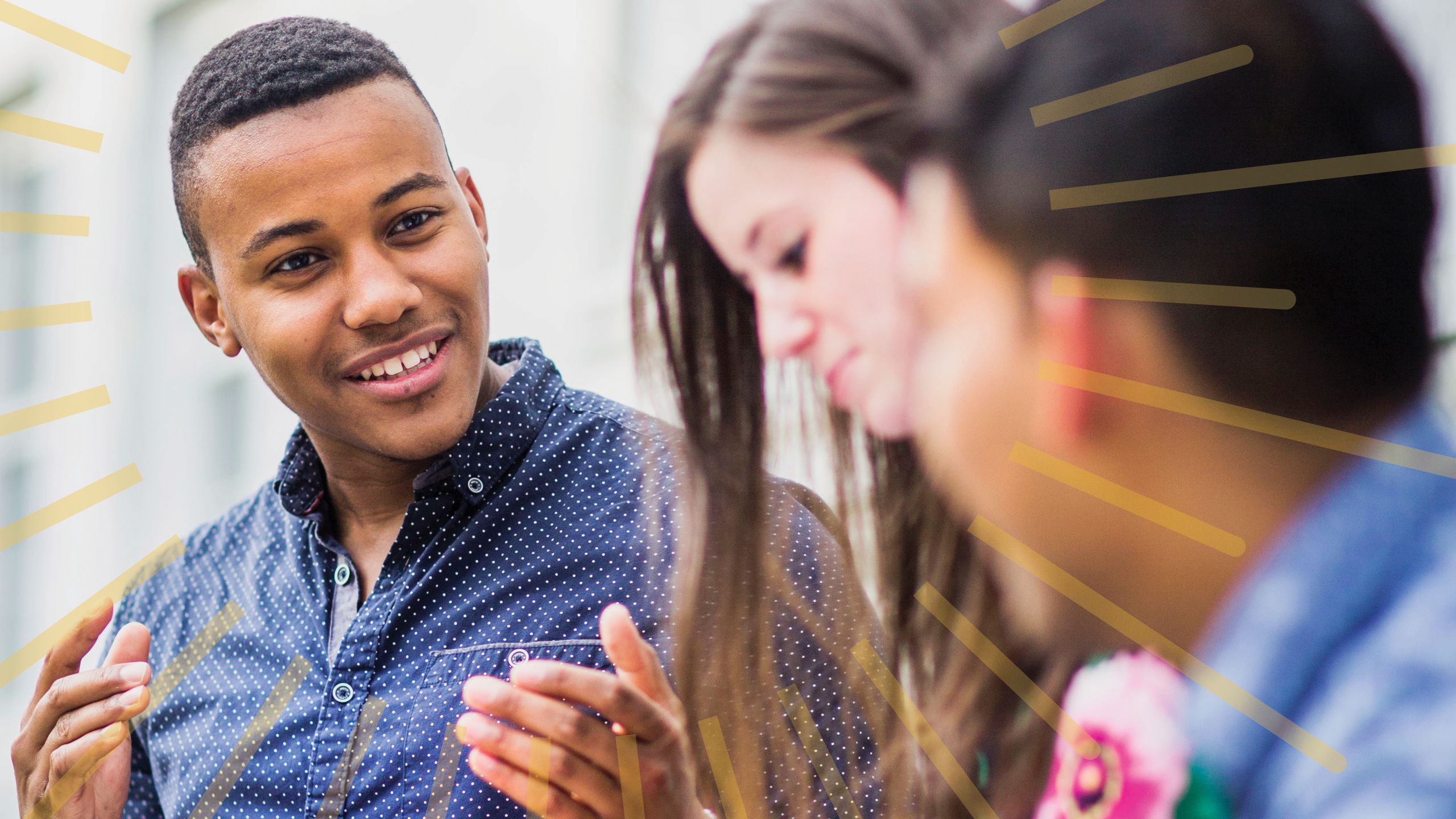
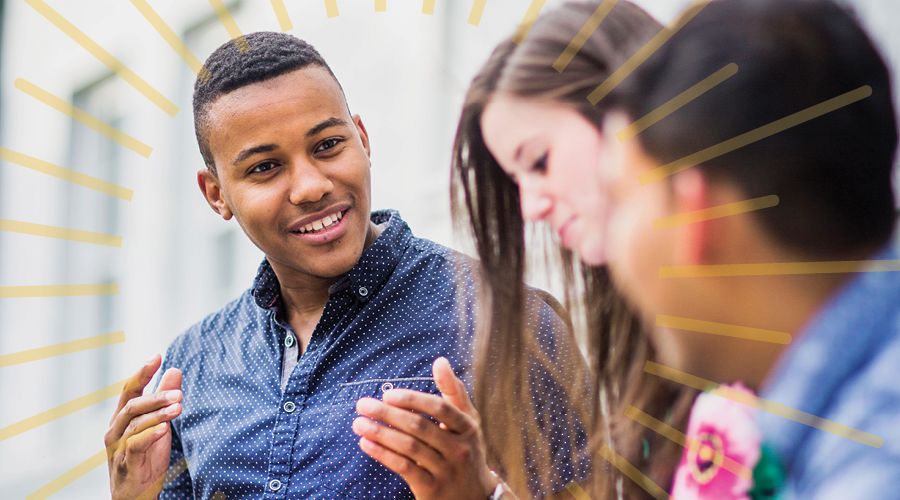
Giving students more opportunities to explore and define their own, meaningful paths is the central mission of the Student Flourishing initiative. From new and reimagined courses to additional spaces for reflection and connection, student flourishing will fundamentally change how Emory defines student success.
As programs roll out during the next couple of years, they will be evaluated by an assessment group, the Emory Undergraduate Council, EPP and, of course, responses from students.
The seven liberal arts, as outlined by Greek philosophers, are grammar, rhetoric, dialectic, music, arithmetic, geometry and astronomy. For Provost Bellamkonda, the Student Flourishing initiative is building upon these traditional studies to create a better world.
“The Student Flourishing initiative is a journey to rediscover the liberal arts,” says Bellamkonda. “At the time they were conceptualized, these were the skills necessary for a person to be successful in life. At Emory we believe that today’s liberal arts remain fantastic vehicles to instill certain habits of the mind, including critical thinking, reflection and analysis, so our students can flourish professionally and lead fulfilling lives.”
Gelaye agrees, adding, “What would be an incredible marker of our success is that when they graduate, students will say Emory cared about me as an individual, that Emory met me where I am and being at Emory helped me be a better person.”
ABOUT THIS STORY: Written by Kelundra Smith. Emory campus photos by Kay Hinton. Oxford campus photos by Stacey Towler. Design by Laura Dengler and Linda Dobson.


Want to know more?
Please visit Emory Magazine, Emory News Center, and Emory University.

